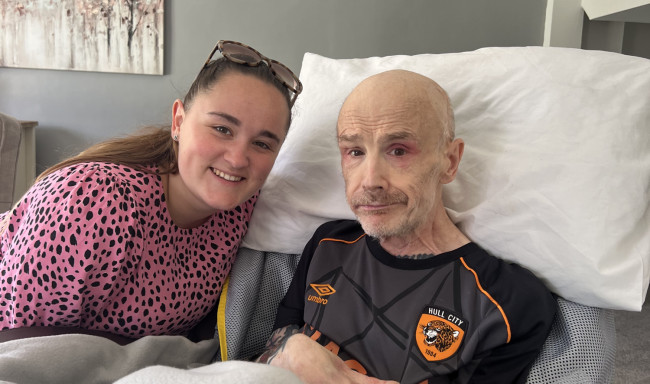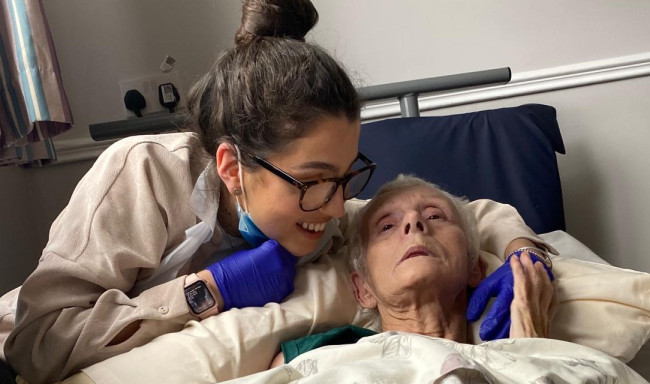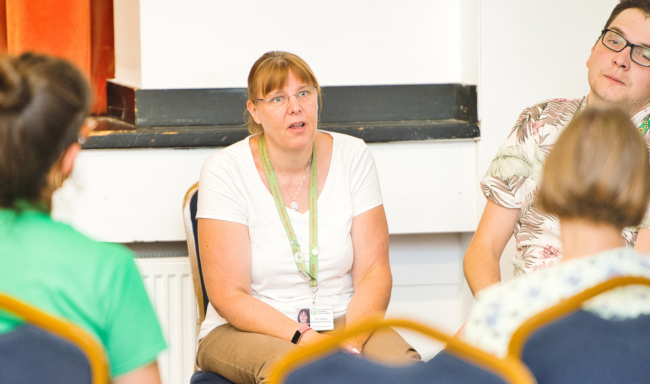A guest blog from Clinical Psychologist, Dr Sarah Gunn about the effects of mental wellbeing across the family and advice about looking after your mental health.
About Sarah
Sarah is a Clinical Psychologist, who has been working and undertaking research with people with Huntington’s for around ten years. She is also a Lecturer, helping to train new Clinical Psychologists, and she recently contributed to new national guidance from the British Psychological Society on psychological interventions for people with Huntington’s. Sarah is part of the “Psychological Interventions and Approaches Working Group” for the European Huntington’s Disease Network, which is a specialist group working to develop ways to support people with Huntington’s disease.
Psychological effects of Huntington’s disease
As a Clinical Psychologist who mostly works with people with neurological conditions, my job is to support people with the difficulties caused by their condition. That includes changes in mood, behaviour, and thinking, which can cause a lot of distress and also practical difficulties with daily living. In this article, I want to talk about the emotional effects of Huntington’s on affected families.
Over time, we are getting better at understanding how Huntington’s psychologically affects people who have it. For example, they might:
- Become frustrated or angry more easily than they used to
- Say or do things they might not have done in the past, or that seem out of character
- Be less motivated to do things than they used to be
- Feel low or anxious
- Seem to process information more slowly, or struggle when there’s too much going on
- And they might not always realise that these things are a problem
These difficulties can be very upsetting for a person with Huntington’s, especially as any problems become more noticeable and start to affect daily life. The person might start to feel embarrassed, scared or angry. If you’re reading this, you may have experienced some of those difficulties or emotions yourself, or you may know someone who has.
You’re also likely to already know that Huntington’s is very much a family affair. There might be several people in a family who have it, are worried they might have it or are worried about someone else who has it. And while being a person who has Huntington’s is of course incredibly difficult, research shows us that people who care for someone with Huntington’s will understandably feel a lot of complex, difficult emotions too.
Thinking about families
In clinical psychology, there has been increasing movement towards “systemic” thinking about psychological wellbeing. This means that we don’t just think about our individual client and their difficulties – we also think about the external factors and relationships that might be affecting that person, and how those might relate to the problems they are experiencing.
This is really relevant if you’re from a family affected by Huntington’s. We know there are some really important factors that can affect everyone in the family, like:
- Effects of psychological symptoms, like the ones described above
- Worry about how physical, cognitive and emotional symptoms may worsen over time
- Feeling isolated
- Worrying about effects on other family members
- Financial worries, especially if there have been changes in who can work, or what kind of jobs or hours people can do
Some of the research I do with my colleagues looks at mental wellbeing in families affected by Huntington’s. To do that, we compare people who have Huntington’s against people who don’t. “People who don’t” might include siblings who didn’t inherit Huntington’s, or people who married into the family so they were never going to inherit it.
These studies have shown us that people with Huntington’s have some mental health difficulties which seem to be specific to carrying the gene expansion, such as:
- “Apathy”, or struggling with motivation to do things. People can also seem less emotional or responsive than they used to be. Apathy seems to be connected to the progression of Huntington’s, meaning it often becomes worse as time goes on.
- “Obsessive-compulsiveness”, this might include having distressing, intrusive thoughts, or feeling compelled to behave in a repetitive way. That might include things like repeated “checking” behaviours.
- “Disorientation”, when a person may become confused about where they are, or what time, day, date or year is it. This usually happens later in the course of Huntington’s, and it can be very stressful for the person with Huntington’s and those who care about them.
Importantly, though, we also found that some mental health difficulties were shared by both people with Huntington’s and family members who didn’t have Huntington’s. Those included:
- Feeling low, especially when thinking about the future, and trying to find pleasure in day-to-day life. That can get harder when you are coping with Huntington’s, for all those reasons in the first section of this article – whether you’re a person who has the condition, or you care for someone who does.
- Feeling anxious, which might include worrying about what comes next, but also things like feeling stressed and panicky. That might include specific worries about something in particular, or feeling anxious more generally.
- Getting angry with other people. Life with Huntington’s can feel very difficult and stressful, for lots of good reasons. It can make people more likely to act in ways that looks aggressive, like shouting or slamming doors.
- Getting angry with yourself. Sometimes people see themselves as failing or letting people down. There might be thoughts about hurting or punishing themselves. These thoughts can be very upsetting, and hard to talk about.
You might recognise some of these feelings or behaviours, either from your own experience or from someone you know. They are pretty common reactions when people are in stressful, difficult and upsetting situations, as we can often experience with Huntington’s.
Aiming for good mental wellbeing
So, what to do if you feel you, or someone in your family, have been affected by these sorts of difficulties?
Firstly, it’s crucial to bear in mind that feeling low, anxious or angry is completely understandable, and it doesn’t necessarily mean that you need to seek professional support. These kinds of emotions are normal when dealing with a very difficult situation, as we know living with Huntington’s to be. It’s important to acknowledge that these emotions are an understandable reaction to challenging circumstances.
Psychologists often use an analogy about needing to look after yourself. During the safety announcements on a plane before take-off, they always remind you that in the event of an emergency, you must put on your own oxygen mask before helping anyone else with theirs. It’s because you can’t help anyone else until you’ve made sure you’re able to breathe yourself. And that’s also true for supporting other people in difficult situations – try to look after yourself too, so you’re able to help look after others.
So if you are finding it difficult to cope with your feelings, or if people you know are becoming worried for you, then it might be time to think about asking for some support:
- You can speak to your GP to see what kind of help might be available. That might include help from a clinical psychologist, counsellor or another kind of therapist. They might also offer medication which could be helpful for you, and they can give you information to help you decide what’s right for you.
- If you are connected to a local NHS Huntington’s service or a support group, they might be able to point you in the right direction.
- You can speak to your local Specialist Huntington’s Disease Adviser, who can offer support and understanding about how you may be feeling.
Whatever route(s) you choose, try to seek help before you reach breaking point – many people try to go on for too long without asking for help, sometimes feeling that others may be more deserving, or thinking they can cope on their own. Be kind to yourself, and remember to put your own oxygen mask on first.
Wellbeing for you
There are also important things you can do yourself, to improve your wellbeing and help yourself cope with the difficulties of living with Huntington’s (as a person who has it, or a family member or carer).
- Make time for things you enjoy. This might be with a family member, with friends, or by yourself. Taking part in activities which make you feel good can lift your mood and provide a much-needed break. Spending time outdoors can be particularly helpful.
- Look after yourself physically (sometimes easier said than done). Try to eat well, avoid alcohol and caffeine if you find they affect you negatively, and get a good amount of sleep.
- If you feel anxious or stressed, try a relaxation exercise. There are so many types:
- Physical exercises (such as “progressive muscle relaxation”) help you to experience relaxation by tensing and releasing your muscles.
- Guided meditations might talk you through a visual imagery exercise, helping you to focus on that rather than your stress or anxiety.
- Mindfulness approaches help you to “detach” or step back from troubling thoughts, using exercises which guide you to focus on your breathing or a mental exercise. These are usually guiding you to keep your mind in the present moment and your experience of “now”, helping you to stop focusing on what has happened or will happen.
- There are plenty of apps available, and YouTube is full of useful videos for all three types of exercise. My favourite is the ”leaves on a stream” mindfulness exercise, where you imagine placing your thoughts onto leaves which float away on the water. It sounds a bit silly, but I recommend giving it a try – it might surprise you!
- Be guided by your values. Huntington’s almost always means that life ends up looking different. But the centre of who we are, the things which are truly important to us, usually remain important. In therapy, I often ask people to think about the things that really matter to them. They start by talking about achievements and goals, things they might not be able to do anymore – things like climbing a mountain, taking far away holidays, or moving to somewhere very rural. If there are things which now seem out of reach for you too, give yourself permission to mourn those losses – they are painful. But when you’re ready, start to gently explore what lay beneath those goals. Are you someone who treasures being close to nature? Do you like to try new things and be adventurous? Are there different ways you can try to live by those values, even though life has changed?
- Finally, and very importantly… talk to someone. Don’t try to cope alone. Whether it’s a friend, a relative, a healthcare professional, or people on the Huntington’s Disease Association forum – we all need a space to vent at times.
If you take three things away from this, please remember this: your emotions are important and valid (put your own mask on first!), there is help out there, and there are good things you can do to look after yourself too.
Thank you so much to Sarah for this insightful article.
If you are a carer for someone with Huntington's disease you can also read our carers guide. If you would like to speak with one of Specialist Huntington's Disease Advisers for advice or support, you can call us on 0151 331 5444 or email us on info@hda.org.uk.








